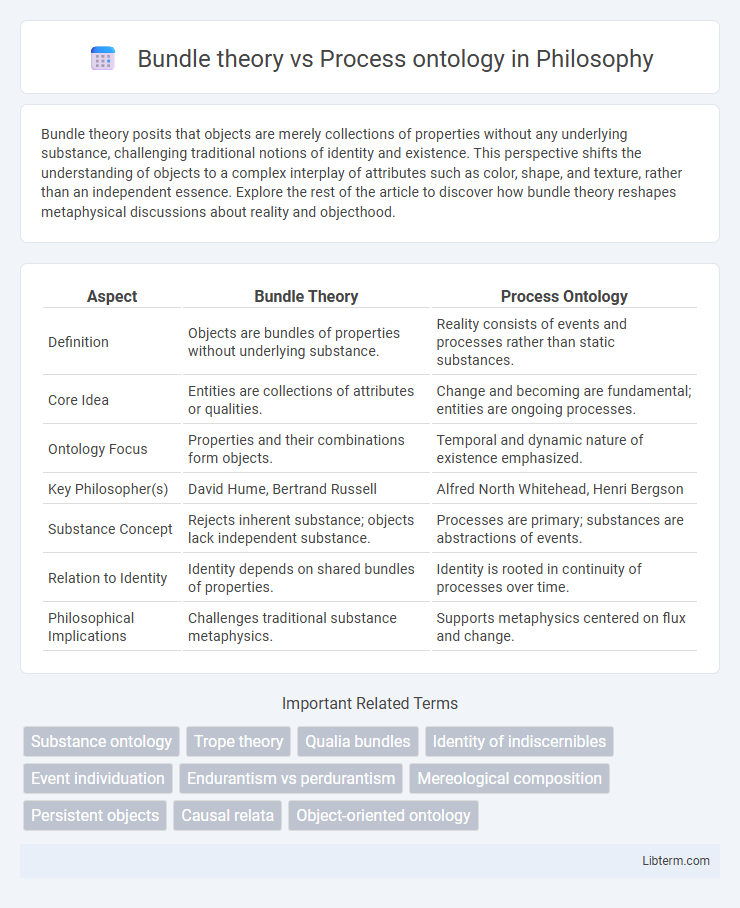Bundle theory posits that objects are merely collections of properties without any underlying substance, challenging traditional notions of identity and existence. This perspective shifts the understanding of objects to a complex interplay of attributes such as color, shape, and texture, rather than an independent essence. Explore the rest of the article to discover how bundle theory reshapes metaphysical discussions about reality and objecthood.
Table of Comparison
| Aspect | Bundle Theory | Process Ontology |
|---|---|---|
| Definition | Objects are bundles of properties without underlying substance. | Reality consists of events and processes rather than static substances. |
| Core Idea | Entities are collections of attributes or qualities. | Change and becoming are fundamental; entities are ongoing processes. |
| Ontology Focus | Properties and their combinations form objects. | Temporal and dynamic nature of existence emphasized. |
| Key Philosopher(s) | David Hume, Bertrand Russell | Alfred North Whitehead, Henri Bergson |
| Substance Concept | Rejects inherent substance; objects lack independent substance. | Processes are primary; substances are abstractions of events. |
| Relation to Identity | Identity depends on shared bundles of properties. | Identity is rooted in continuity of processes over time. |
| Philosophical Implications | Challenges traditional substance metaphysics. | Supports metaphysics centered on flux and change. |
Introduction to Bundle Theory and Process Ontology
Bundle Theory posits that objects are merely collections of properties or qualities without an underlying substance, emphasizing that entities are nothing beyond the sum of their attributes. Process Ontology, alternatively, suggests that reality is fundamentally constituted by processes and events rather than static entities, viewing change and becoming as primary. The distinction highlights that Bundle Theory centers on the aggregation of properties to explain objects, whereas Process Ontology focuses on dynamic processes as the fundamental components of existence.
Historical Background and Philosophical Roots
Bundle theory originated with David Hume in the 18th century, emphasizing objects as collections of properties without underlying substance. Process ontology traces its roots to Alfred North Whitehead's early 20th-century metaphysics, prioritizing dynamic processes over static entities. Both theories challenge substance-based views but diverge in conceptualizing reality--bundle theory focuses on property aggregates, while process ontology centers on events and becoming.
Core Principles of Bundle Theory
Bundle theory posits that objects are strictly collections of properties without an underlying substance, emphasizing that entities are bundles of attributes interconnected by their qualities. This core principle rejects the notion of a bare particular, suggesting that what we identify as objects are merely compendiums of perceptible and relational properties. The theory contrasts with process ontology, which views reality as a continuous flow of processes rather than static aggregates of properties.
Essential Tenets of Process Ontology
Process ontology emphasizes reality as constituted by dynamic processes and events rather than static objects, contrasting with bundle theory which views objects as bundles of properties. Central tenets include the primacy of becoming over being, the interconnectedness of processes, and the rejection of substance as the fundamental ontological category. This framework asserts that entities are better understood as ongoing processes, with identity and persistence grounded in temporal development and relationality.
Key Differences between Bundle Theory and Process Ontology
Bundle theory posits that objects are merely collections of properties without underlying substance, emphasizing static aggregates of attributes. Process ontology, contrastingly, views reality as a series of dynamic events or processes, highlighting temporal development and continuous change rather than fixed entities. The key difference lies in bundle theory treating objects as property bundles, whereas process ontology considers processes as the fundamental constituents of existence.
Major Philosophers and Influential Works
Bundle theory, primarily advanced by David Hume in "A Treatise of Human Nature," posits that objects are merely collections of properties without any underlying substance. Process ontology, articulated by Alfred North Whitehead in "Process and Reality," emphasizes becoming and change, arguing that reality is fundamentally constituted by processes rather than static entities. Contemporary philosophers like Sydney Shoemaker and C. D. Broad have contributed to refinements in bundle theory, while process ontology has influenced fields such as metaphysics and philosophy of science, reflecting a dynamic view of existence.
Applications in Metaphysics and Ontology
Bundle theory applies in metaphysics by explaining objects as collections of properties, facilitating analysis of identity and persistence over time. Process ontology shifts focus from static entities to dynamic events or processes, enriching ontological frameworks that model change and becoming. Both approaches influence debates on substance, causality, and the nature of existence in contemporary metaphysical research.
Criticisms and Limitations of Bundle Theory
Bundle theory faces criticism for its inability to account for the unity of objects, as it treats objects merely as collections of properties without a substance underlying them. Critics argue that this leads to the problem of compresence, where it becomes difficult to explain how multiple properties coexist as one entity. Moreover, bundle theory struggles with the issue of identity over time, failing to clarify how objects persist despite changes in their properties.
Challenges and Debates in Process Ontology
Process ontology faces challenges in adequately accounting for the persistence of entities over time while emphasizing continuous change, leading to debates on identity and individuation. Critics argue that process ontology struggles with explaining stable object boundaries and properties, conflicting with traditional substance-based metaphysics such as bundle theory. Ongoing debates also center on reconciling the flux-centric worldview with empirical observations and the coherent categorization of processes versus discrete entities.
Contemporary Relevance and Future Directions
Bundle theory, which conceptualizes objects as collections of properties, remains significant in debates on identity and persistence, particularly in metaphysics and cognitive science. Process ontology, emphasizing becoming and change over static entities, gains traction in fields like biology, physics, and information technology for modeling dynamic systems and emergent phenomena. Future directions suggest integrating these frameworks to better address complex systems, advancing AI, and enhancing philosophical understandings of temporal continuity and objecthood.
Bundle theory Infographic

 libterm.com
libterm.com